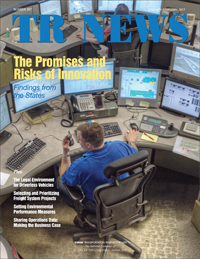
Specialists in the Transportation Research Board’s (TRB’s) Technical Activities Division identify current issues, collect and generate information on the issues, and disseminate the information throughout the transportation community. The TRB Annual Meeting, TRB-sponsored conferences and workshops, webinars, standing committee meetings and communications, publications, and contact with hundreds of organizations and thousands of individuals provide TRB staff with information from the public and private sectors on all modes of transportation. A major source of this information is the TRB annual state partnership visits program. Transportation professionals on the TRB staff meet on site with representatives of state departments of transportation and with representatives of universities, transit and other transportation agencies, and industry. In addition, TRB staff is involved with planning and delivering conferences, workshops, webinars, and meetings. This report summarizes what the TRB staff learned from visits and activities during the past year.
Freight The FAST Act, signed into law in December 2015, highlighted the importance of the U.S. freight transportation system. The FAST Act authorized $1.2 billion per year in formula funding for a new National Highway Freight Program, required the establishment of a designated National Highway Freight Network, and authorized a $4.5-billion discretionary competitive grant program to support highway, rail, port, and intermodal freight projects. To take advantage of the formula funding program, a state must develop a freight plan by December 2017 that “comprehensively [addresses] the state’s immediate and long-range freight planning activities and investments.” Many states have established freight advisory committees composed of public- and private-sector freight stakeholders to assist in identifying priority areas for freight mobility.
Transportation planners continue to focus on first- and last-mile delivery issues, especially in urban environments. Proposed projects involve off-hours deliveries, lockboxes, and consolidated pickup locations. The City of Seattle has promised $285,000 over the next three years to support the University of Washington’s new Urban Freight Lab, which brings together freight carriers and public planning agencies to consider issues and innovative strategies related to urban delivery.